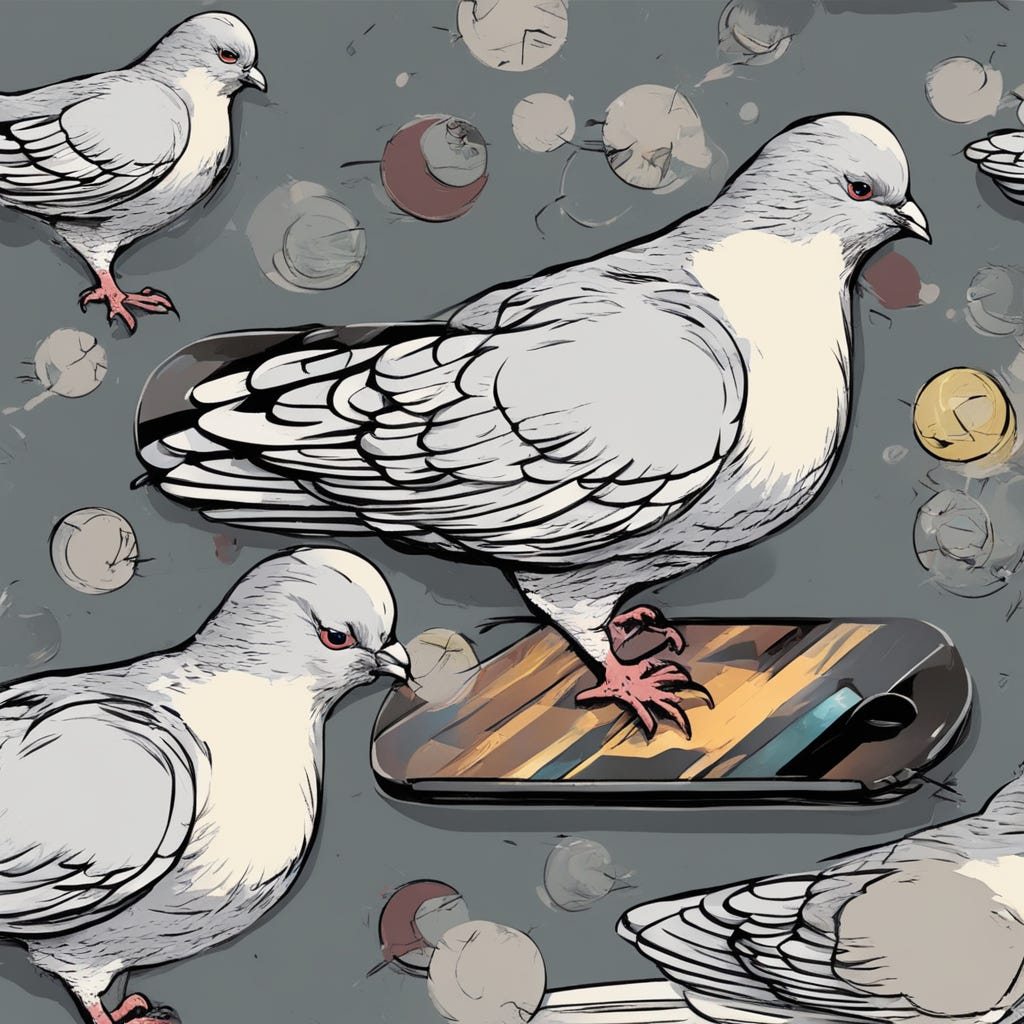The Bluestocking, vol 298: pigeons on phones
a colony of 15,000 wild scorpions living in the walls
Happy Friday!
A small programming note: expect a Bluestocking next week, and then radio silence for 2 weeks as I turn myself over fulltime to digesting mince pies.
This week I recorded not just the regular fortnightly episode of Page 94—about “Dark Starmer,” COP28 and the sale of the Telegraph—but also a special Quiz of the Year, to go out over the Christmas break.
The Atlantic also has articles for days to tide you over: I took part in a special issue answering the question: What if Trump wins again? In the lead article, my colleague David Frum—who once worked for George W Bush—outlined these five priorities for a second Trump administration:
(1) Stop all federal and state cases against Trump, criminal and civil.
(2) Pardon and protect those who tried to overturn the 2020 election on Trump’s behalf.
(3) Send the Department of Justice into action against Trump adversaries and critics.
(5) If these lawless actions ignite protests in American cities, order the military to crush them.
So that’s cheery. Sophie Gilbert has written about four more years of unchecked misogyny. George Packer has written about the challenge to journalism. My own (small) contribution is a warning to the left that it can’t afford get dragged into pointless battles, purity spirals and online grandstanding, like last time. It’ll be online later today.
See you soon,
Helen

The Evolution of Modern Dogs (Garden of Forking Paths)
As dog shows became more popular, the Victorians were struck by the unfortunate subjectivity of the contests. The same dog might win one dog show, only to finish last in another, because there were no agreed-upon standards, nor any well-defined breeds. The same “race” of dog could look wildly different, so long as it fulfilled the same function.
But the rise of dog shows coincided with a profound social obsession in Victorian Britain: to count, measure, quantify, and categorize everything. Dog shows grew in popularity at the same time that early statistical societies were formed, alongside nascent forms of social science. […] In Hard Times, Charles Dickens presents Mr. Gradgrind, a harsh educational disciplinarian who only has tolerance for distilling reality down into facts and data: “Now what I want is, facts… Facts alone are wanted in life,” he insists.
In this spirit, the English surgeon and sportswriter John Henry Walsh published the first modern classification system for modern dog breeds, The Dogs of the British Islands. As Worboys writes in his book, Doggy People, this was “the first reference handbook of standards, illustrated with examples of the best in breed at recent shows.” Walsh identified several physical “points” at which dogs could be measured, classified, and categorized. This was the first time that dogs were being defined by how they looked, rather than what they did.
Brian Klaas on how Victorians created modern dog breeds, and how they’ve been fixed for a century.
52 Things I Learned in 2023 (Medium)
In a recent experiment, “a group of domesticated birds were taught to call one another on tablets and smartphones.” They enjoyed it and made new friendships. [Schuyler Velasco]
A group of Carmelite monks in Wyoming are building themselves a gothic monastery using 3D design software and stone-carving robots: [Anool Mahidharia]
There’s been a colony of 15,000 wild scorpions living in the walls of Sheerness Dockyard, Kent, for over 200 years. [John Nurden]
Tom Whitwell’s annual list of unlikely facts is one of my favourite Christmas traditions. (Another is Sam Bowman’s list of consumer goods to buy and use. That’s sadly taking a break this year, which is probably good for my bank balance, as last year it gave me the impetus to finally get adult braces).
Quick Links
Surprise! Real Japanese homes aren’t a Marie Kondo minimalist wonderland. In fact, many are champions of “hoarder hygge” (Pure Invention, Substack).
I enjoyed Sarah Ditum enjoying Saltburn (Tox Report, Substack).
“They were married 31 years, and then one evening Nicholas said he wasn’t feeling well. He had a funny neck. It had gone all scraggy, like Cliff Richard. He went to see the doctor, found out it was cancer, and died a few months later. Not long after, she married his best friend, Arthur, and raised his two young sons. Thirteen years later, Arthur died, and she was on her own again. So much life, in a life.” Sophie Elmhirst has done it again: a beautiful long read about a couple who fell in love in a care home (Guardian).
The only pure Facebook group (twitter).
A lovely backstage look at the latest Doctor Who episode, “Wide Blue Yonder,” by its director on Twitter. All the way through watching it I kept going, ooh that’s Disney money, that is.
Interesting (partially paywalled) thoughts from James O’Malley on the future of my old magazine, the New Statesman (Substack).
“How did 95% of Venezuela’s voters get it into their heads that a jungle hinterland hardly any Venezuelans have ever lived in is properly theirs?” (Persuasion)
Taylor Swift did an interview to coincide with being TIME’s person of the year (wonder if she had copy approval?) along with a baffling Norma Jean-style photoshoot. I did like how the interviewer acknowledged her brilliance at self-mythlogising—that opening anecdote—and I endorse the Swiftian life motto: “Trash takes itself out.”
See you next time! And thank you for the books—as well as digesting mince pies, I will be reading about everything from the spare Habsburg they sent to Mexico to Northern Irish paramilitaries.





How did this garbage get into my TL?
Everything they say about Trump, they've already done, to Bernie Sanders, to Trump, to the J6ers (J6, which will go down in history as an op); they are the party of Epstein Island.
No one is in bigger denial about end-stage capitalism than the 10% of society benefitting from it and their low-info lackeys.
And, while both parties have helped created this dystopian, neofeudal race to the bottom, the Democrats are a bit worse right now, because they believe their own lies.
Having read about pigeons on phones and recently hearing from Hannah Fry that pigeons are extremely good at distinguishing images of cancer cells from normal ones, (if you exclude the one stupid pigeon), I'm wondering if I should be worried about pigeon apocalypse 🤔